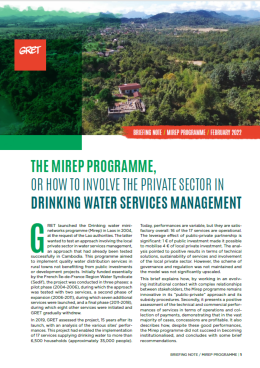RWSN Library

Author
GRET
Year of Publishing
2022
Publisher
Institution
The Mirep programme, or how to involve the private sector in drinking water services management
Description:
GRET launched the Drinking water mini-networks programme (Mirep) in Laos in 2004,at the request of the Lao authorities. The latter wanted to test an approach involving the local private sector in water services management, an approach that had already been tested successfully in Cambodia. This programme aimed to implement quality water distribution services in rural towns not benefitting from public investments
or development projects. Initially funded essentially by the French Île-de-France Region Water Syndicate (Sedif), the project was conducted in three phases: a pilot phase (2004-2006), during which the approach
was tested with two services, a second phase of expansion (2006-2011), during which seven additional services were launched, and a final phase (2011-2018), during which eight other services were initiated and
GRET gradually withdrew.
In 2019, GRET assessed the project, 15 years after its launch, with an analysis of the various sites’ performances. This project had enabled the implementation of 17 services supplying drinking water to more than
6,500 households (approximately 35,000 people).
Today, performances are variable, but they are satisfactory overall: 16 of the 17 services are operational. The leverage effect of public-private partnership is significant: 1 € of public investment made it possible
to mobilise 4 € of local private investment. The analysis pointed to positive results in terms of technical solutions, sustainability of services and involvement of the local private sector. However, the scheme of
governance and regulation was not maintained and the model was not significantly upscaled.
This brief explains how, by working in an evolving institutional context with complex relationships between stakeholders, the Mirep programme remains innovative in its “public-private” approach and its
subsidy procedures. Secondly, it presents a positive assessment of the technical and commercial performances of services in terms of operations and collection of payments, demonstrating that in the vast
majority of cases, concessions are profitable. It also describes how, despite these good performances, the Mirep programme did not succeed in becoming institutionalised, and concludes with some brief recommendations.
Bibliographical Information:
GRET (2022) The Mirep programme, or how to involve the private sector in drinking water services management .
More Information
DOWNLOADS (9)
The Mirep programme, or how to involve the private sector in drinking water services management
 Google Übersetzer
Google Übersetzer
